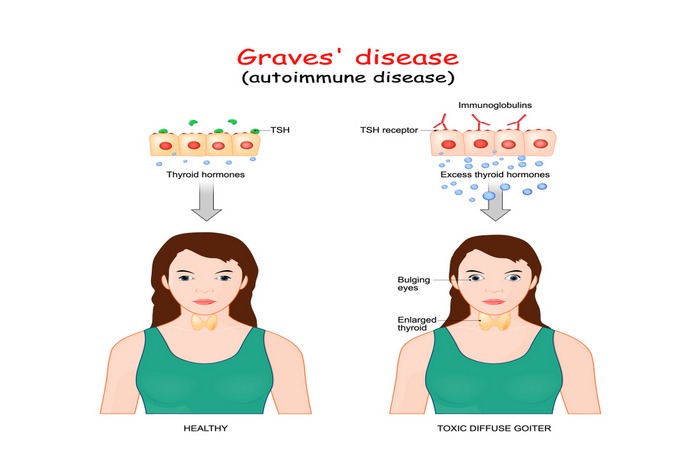Graves’ disease
This disease is named after Robert J. Graves, who first described the condition in 1835. It is an autoimmune disorder that causes the overproduction of thyroid hormones (hyperthyroidism). It is estimated that it affects one in every 1,000 people and occurs more often in women than in men and is most commonly diagnosed in people between the ages of 20 and 40. (1)
Graves’ disease is caused by a malfunctioning immune system that attacks the thyroid gland. This attack leads to the over-production of thyroid hormone, which can cause a number of symptoms, including weight loss, rapid heart rate, anxiety, sweating, and difficulty sleeping.
If left untreated, Graves’ disease can lead to serious health problems such as heart failure or osteoporosis. However, most cases can be treated with medications or surgery.

Pathophysiology
Graves’ disease is an autoimmune disorder that results when the body produces antibodies that attack the thyroid gland. The thyroid gland is located in the front of the neck and is responsible for producing hormones that control metabolism. In this disease, the body produces certain antibodies that mistakenly attack the thyroid gland. These antibodies (IgG antibodies) bind to receptors on the thyroid gland and stimulate it to produce excess amounts of thyroid hormone. (2)
Studies have shown that patients with Graves’ disease have higher levels of IgG antibodies than healthy individuals. It is thought that these antibodies may mistakenly target the thyroid gland, causing it to produce too much thyroid hormone. The role of IgG antibodies in Graves’ disease is still being studied, and more research is needed to determine their exact role in the development of the disease.
The pathophysiology of Graves’ disease is not completely understood, but it is thought that the antibodies that are produced in response to the overactive thyroid gland bind to the receptors on the cells of the pituitary gland. This triggers the pituitary gland to produce more thyroid-stimulating hormone (TSH), which then causes the thyroid gland to produce more thyroid hormones.
The over activity of the thyroid gland can lead to a number of symptoms, including weight loss, rapid heart rate, sweating, and anxiety. The exact cause of Graves’ disease is unknown, but it is believed to be caused by a combination of genetic and environmental factors.

